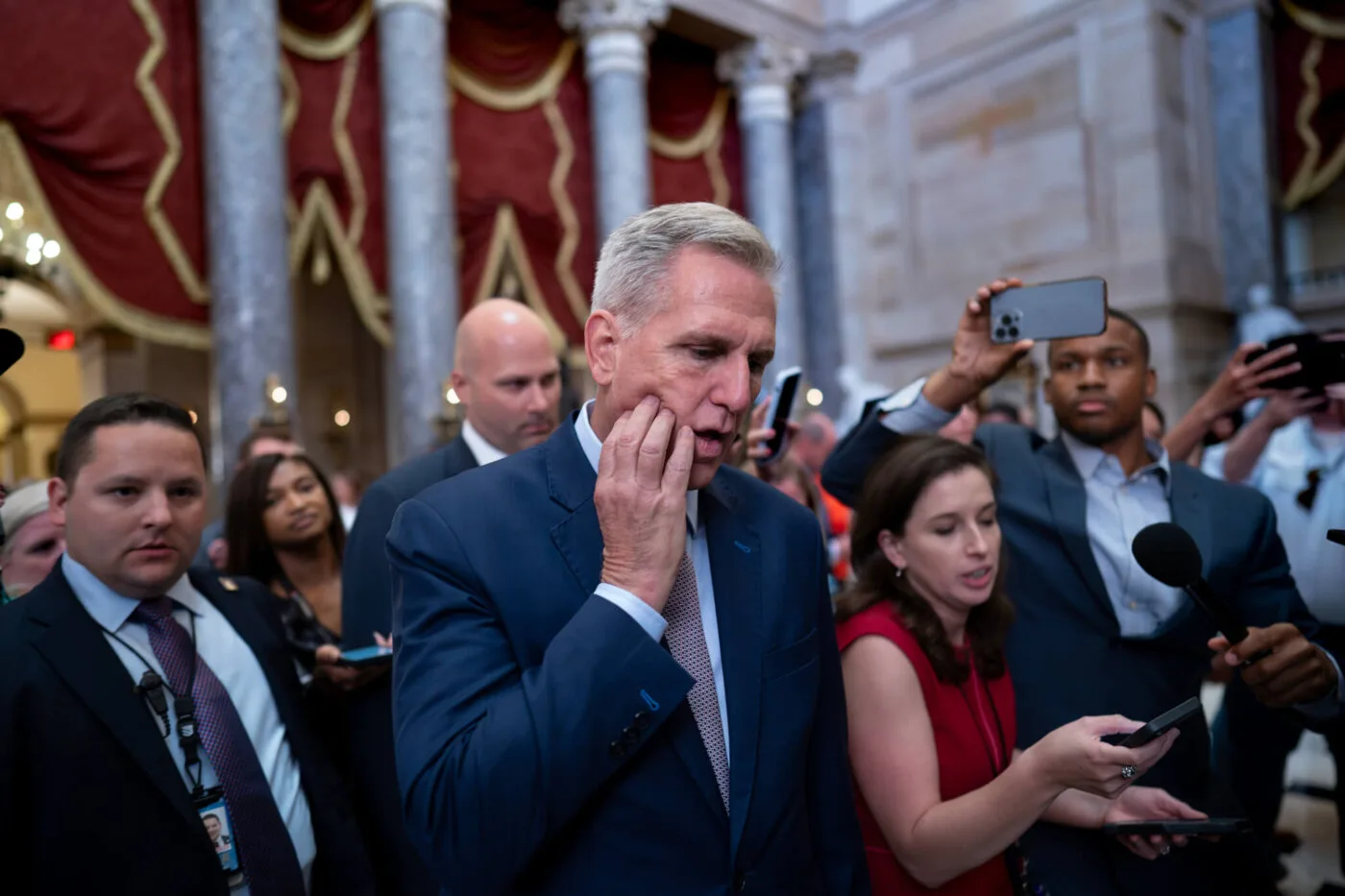
Speaker of the House Kevin McCarthy, R-Calif., walks to his office after a resolution to debate the defense bill failed 212-214, as five Republicans bucked the party to sink it, at the Capitol in Washington, Tuesday, Sept. 19, 2023. House Republican leaders have still been unable to pass next year's appropriations bills on the floor due to GOP infighting. (AP Photo/J. Scott Applewhite)
House Speaker Kevin McCarthy has repeatedly tried to pass budget proposals that meet the demands of far-right Republicans, but he has been unable to wrangle the necessary 218 votes to pass any of the 12 annual funding bills necessary to prevent a shutdown.
The United States government is headed for a shutdown in less than 10 days, due to the failure of Republicans in the House of Representatives to agree on a new federal budget amongst themselves, let alone with Senate Democrats and Republicans and the White House.
A shutdown, which would be the fourth Republican-caused shutdown over the past decade, could have significant consequences on workers, public safety, disaster preparedness and response, food and safety inspections, and the economy.
How We Got Here
Every year, Congress must pass and the president must sign 12 annual funding bills providing money for different federal agencies and programs. Sometimes these bills are bundled together into one piece of legislation, known as an “omnibus.”
If lawmakers fail to reach a budget deal by Oct. 1, the beginning of each fiscal year, then the government shuts down. If some agencies are funded, but others aren’t, a partial shutdown could occur.
Most of the time under divided government, the two parties reach a deal after a lot of negotiations, compromise, and at least one stopgap bill that keeps funding levels flat for a few weeks or months, to give lawmakers more time to negotiate.
This year looks to be different.
Republicans won control of the House last November, and House Speaker Kevin McCarthy has spent much of this year giving in to demands from the far-right wing of his caucus, including members of the so-called “Freedom Caucus,” who’ve built a reputation as “legislative terrorists” for their hostility to government and ability to sow chaos.
As part of negotiations on the budget, Freedom Caucus members have called for extreme spending cuts, including to childcare programs, Meals on Wheels and other food assistance efforts, education funding, loan programs for farmers, job training programs, and more. Many Republicans specifically oppose providing any more aid to Ukraine as it defends itself against Russia’s brutal invasion.
Over the past few months, McCarthy has repeatedly tried to pass budget proposals that meet many of those demands, all of which would ultimately fail in the Democratic-controlled Senate. Even still, McCarthy has been unable to wrangle the necessary 218 votes to pass any of the 12 annual funding bills, as different far-right lawmakers keep pushing for deeper cuts.
McCarthy has also thus far refused to work with House Democrats on a bipartisan deal, fearing it could prompt a vote from Republicans to remove him from his position as speaker.
The House GOP’s inability to internally agree has resulted in weeks of chaos, with members of McCarthy’s own caucus calling him “weak” and accusing him of “lying like a dead dog.”
“It’s a s*itshow in the House,” Sen. Lindsey Graham (R-South Carolina) said.
RELATED: No Evidence of Wrongdoing—So Why Are Republicans Trying to Impeach Biden?
Even Republicans are admitting they’ll be at fault if a shutdown occurs.
“I think the governing majority, which is presiding at the time the government shuts down, probably is going to bear a lot of the blame,” Rep. Steve Womack (R-Arkansas) told Politico this week. “And we’re the ones with the gavel … it’s our job to run the government.”
“We will have a government shutdown and it is absolutely Speaker McCarthy’s fault,” added Florida Republican Matt Gaetz, one of McCarthy’s far-right antagonists. “We cannot blame Joe Biden for not having moved our individual spending bills. We cannot blame House Democrats. We can’t even blame Chuck Schumer in the Senate.”
What a Government Shutdown Means for You
If you’re one of the millions of federal workers, you’ll be sent home and won’t get paid. If you’re an essential government worker, like a law enforcement officer, active duty military personnel, air traffic controller, or TSA employee, you’ll still work, but you might not get paid until after the shutdown ends.
Federal housing loans and loans to small businesses could be temporarily halted.
Environmental and food inspections could be limited or delayed, increasing the risk to the food supply, drinking water, and chemical facilities.
If a natural disaster occurs during the shutdown, FEMA’s ability to respond could be impacted.
Tens of thousands of children could lose access to federally-funded childcare slots.
Travelers could experience delays at airports as air traffic controllers and TSA officers work without pay.
If you want to visit a National Park, you likely won’t be able to.
If you’re one of the tens of millions of Americans who rely on food aid from the Supplemental Nutrition Assistance Program (SNAP), you might not get those benefits.
And if a shutdown drags on for weeks or months, it could have an economic impact, with missed paychecks leading to lower consumer spending. The last shutdown that began in late 2018 and ran into early 2019 cost the US economy $11 billion, according to the nonpartisan Congressional Budget Office.
These Services Will Remain Functional
Social Security recipients will keep getting their payments, because they aren’t funded through the annual budget process. Medicare and Medicaid coverage will also continue without interruption.
VA medical facilities and clinics would also remain operational, but VA call centers and hotlines would not. A shutdown could also create a backlog of veterans’ disability claims.
The United States Postal Service will also continue service.
The White House’s Stance
President Biden has been clear where he stands on the budget: he wants to make a bipartisan deal, but opposes the House Republicans’ various proposals and the threats of a shutdown.
“They’re back at it again, breaking their commitment, threatening more cuts and threatening to shut down government again,” Biden said in a speech at Prince George’s Community College in Maryland last week.
“For all the time they spend attacking me and my plan … they never talk about what they want to do,” Biden added. “Their plan – MAGAnomics – is more extreme than anything Americans have seen before.”
What Happens Next?
After a week where they made no progress and failed for the second time to pass the party’s Defense spending bill, McCarthy sent House Republicans home for the weekend on Thursday.
“We are very dysfunctional right now,” Rep. Tim Burchett (R-Tennessee) told NBC News, adding that his party’s failure proves that Republican leaders “obviously can’t count” votes, like Democrats. “Speaker Pelosi, love her or hate her, she put something out there and they’d rally around it.”
Republicans appeared unsure what would happen next week, when they reconvene.
“This is a whole new concept of individuals that just want to burn the whole place down,” McCarthy said on Thursday. “It doesn’t work.”
Politics

The Civil War raged and fortune-seekers hunted for gold. This era produced Arizona’s abortion ban
Arizona's 1864 code elaborately describes restrictions on duels, ruling any person involved in the fighting of a duel would be imprisoned for one to...

VIDEO: Arizona Gov. Katie Hobbs calls 1864 abortion ban ‘absolutely outrageous’ on ‘The View’
@coppercourier Former President Donald Trump and US Senate candidate Kari Lake have both attempted to cover up their support for total abortion bans...
Local News

Trump says he’s pro-worker. His record says otherwise.
During his time on the campaign trail, Donald Trump has sought to refashion his record and image as being a pro-worker candidate—one that wants to...

VIDEO: Hundreds show up in Scottsdale to support reproductive rights
@coppercourier Days after the Arizona Supreme Court ruled to enforce a long-dormant law that bans nearly all abortions, hundreds took part in a...




